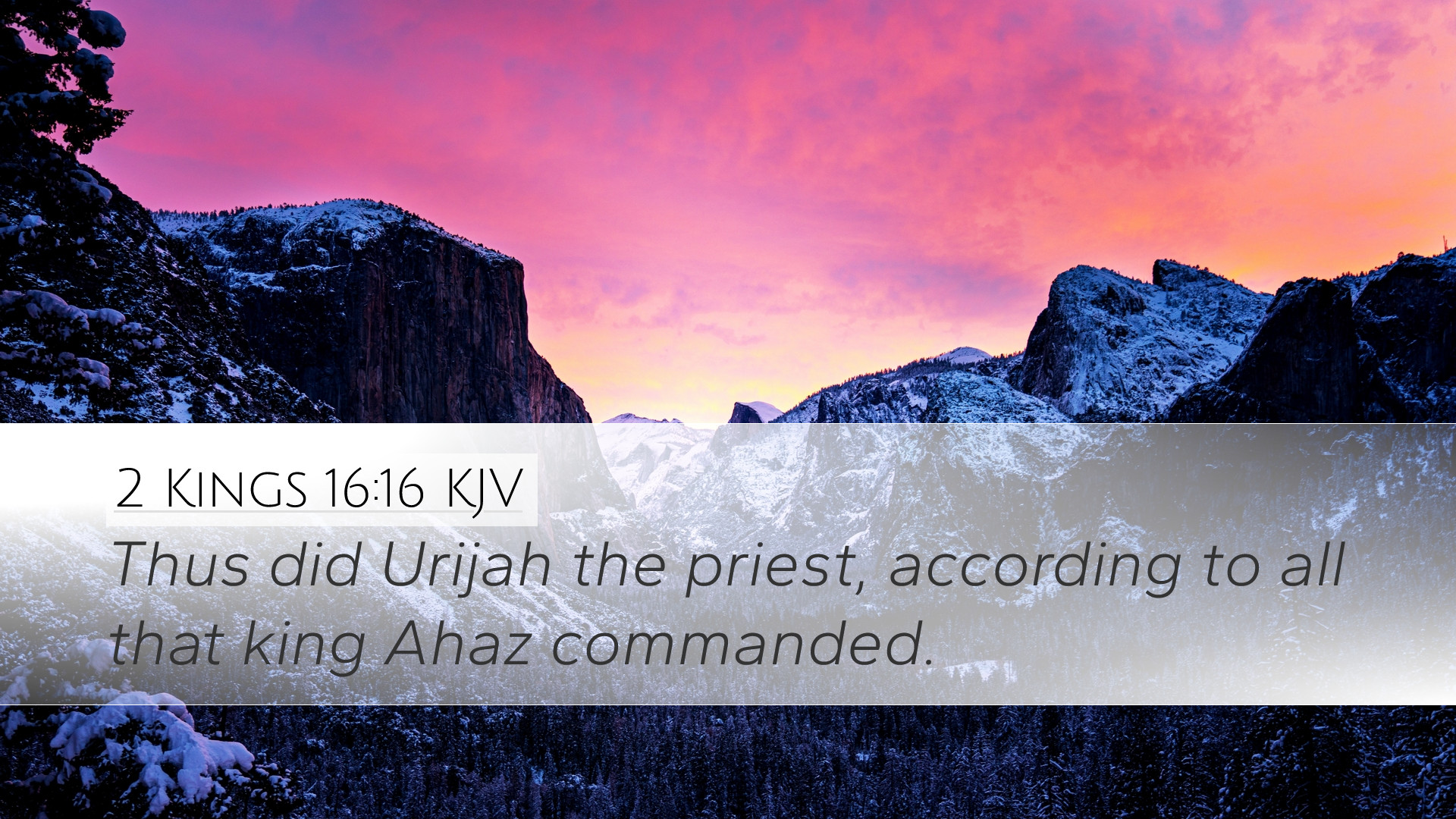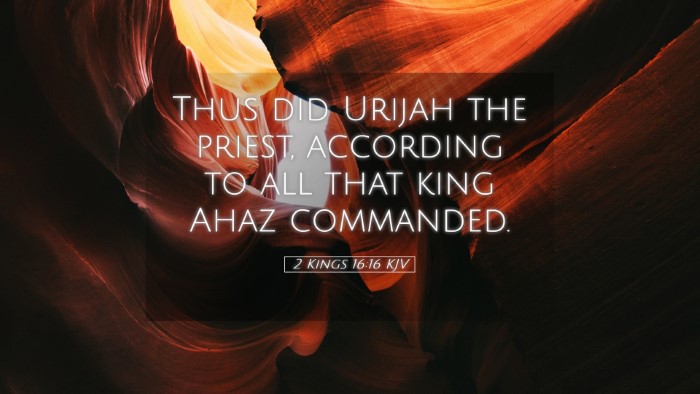Old Testament
Genesis Exodus Leviticus Numbers Deuteronomy Joshua Judges Ruth 1 Samuel 2 Samuel 1 Kings 2 Kings 1 Chronicles 2 Chronicles Ezra Nehemiah Esther Job Psalms Proverbs Ecclesiastes Song of Solomon Isaiah Jeremiah Lamentations Ezekiel Daniel Hosea Joel Amos Obadiah Jonah Micah Nahum Habakkuk Zephaniah Haggai Zechariah Malachi2 Kings 16:16
2 Kings 16:16 KJV
Thus did Urijah the priest, according to all that king Ahaz commanded.
2 Kings 16:16 Bible Commentary
Commentary on 2 Kings 16:16
Verse Context: 2 Kings 16:16 states: "And Uriah the priest did according to all that king Ahaz commanded." This highlights a crucial moment in the reign of King Ahaz of Judah, a king known for his unfaithfulness to God and embracing pagan practices.
Overview of the Reign of Ahaz
Background: King Ahaz became king of Judah at a young age and reigned during a tumultuous period. His leadership was characterized by idolatry and an alliance with Assyria. Ahaz’s actions set a dangerous precedent through which his kingdom strayed from worshiping Yahweh.
The Role of Uriah the Priest
Uriah's Compliance: The verse reveals Uriah's obedience to King Ahaz’s orders, which were contrary to the commandments of God. This compliance indicates the alarming departure from the traditional role of priests, who were to uphold worship according to the Law of Moses.
Insights from Public Domain Commentaries
Matthew Henry:
Henry notes that Uriah the priest's readiness to carry out Ahaz's commands illustrates a disturbing trend of priests aligning themselves with secular power rather than divine righteousness. He emphasizes that Uriah’s actions reflect how corruption can infiltrate religious institutions when leadership turns away from divine ordinances. The priesthood was meant to be a check on the king's actions, grounding authority in theological truth rather than personal ambition.
Albert Barnes:
Barnes provides a critical view of Ahaz’s decisions in context. He outlines the implications of Uriah's acts, suggesting that they signify the spiritual decay of Judah. Uriah engaged in practices that would have been anathema in a faithful regime, indicating that the national leadership, including religious figures, had traded divine principles for political expediency. Barnes underscores the danger of compromising religious integrity for the sake of alignment with worldly powers.
Adam Clarke:
Clarke presents a detailed examination of Uriah's role, indicating that his compliance further entrenched idolatry within Judah. He elaborates on the significant shift in the worship practices as Uriah constructed an altar based on Ahaz's design, which mirrored pagan worship. Clarke points out that Uriah's failure to resist the king’s directives not only reflects poorly on him but also marks a grave deterioration in the spiritual life of the nation.
Theological Themes
Spiritual Compromise
This verse exemplifies the danger of spiritual compromise in leadership. The priest's acquiescence to the king’s commands devoid of divine sanction illustrates how easily faith can be manipulated and corrupted by political interests. It serves as a warning to contemporary leaders about the importance of maintaining integrity in both religious and civic duties.
The Role of Leadership
The interaction between Ahaz and Uriah highlights the dynamics of authority. While kings wield significant power, their authority is not absolute, especially in matters of faith. This situation prompts reflection on the responsibilities of religious leaders to uphold Scripture and resist secular pressures that deviate from biblical truth.
Application for Today
Lessons for Modern Believers: The narrative encourages modern believers, particularly leaders within the church, to align closely with God's Word rather than societal norms or pressures. Uriah's actions serve as a cautionary tale against failing to stand for truth amidst the prevailing influences of culture.
- Vigilance in Leadership: Leaders must be vigilant about the faith they promote and the influences they allow within their congregations.
- Integrity Over Expediency: Prioritizing God’s instructions above political or social conformity is critical for preserving spiritual health.
- Promotion of Sound Doctrine: Encouraging sound doctrine and authentic worship practices is essential to counteract the encroachment of secular ideologies in religious practice.
Conclusion
2 Kings 16:16 serves as a powerful reminder of the need for fidelity to God’s commands amidst challenges. The commentary from Henry, Barnes, and Clarke collectively underlines the imperative for leadership—be it civil or ecclesiastical—to prioritize divine truth over temporal authority. As pastors, students, theologians, and scholars reflect on this passage, may they draw strength and wisdom from its lessons, ensuring that their lives and ministries reflect a steadfast commitment to God and His Word.


